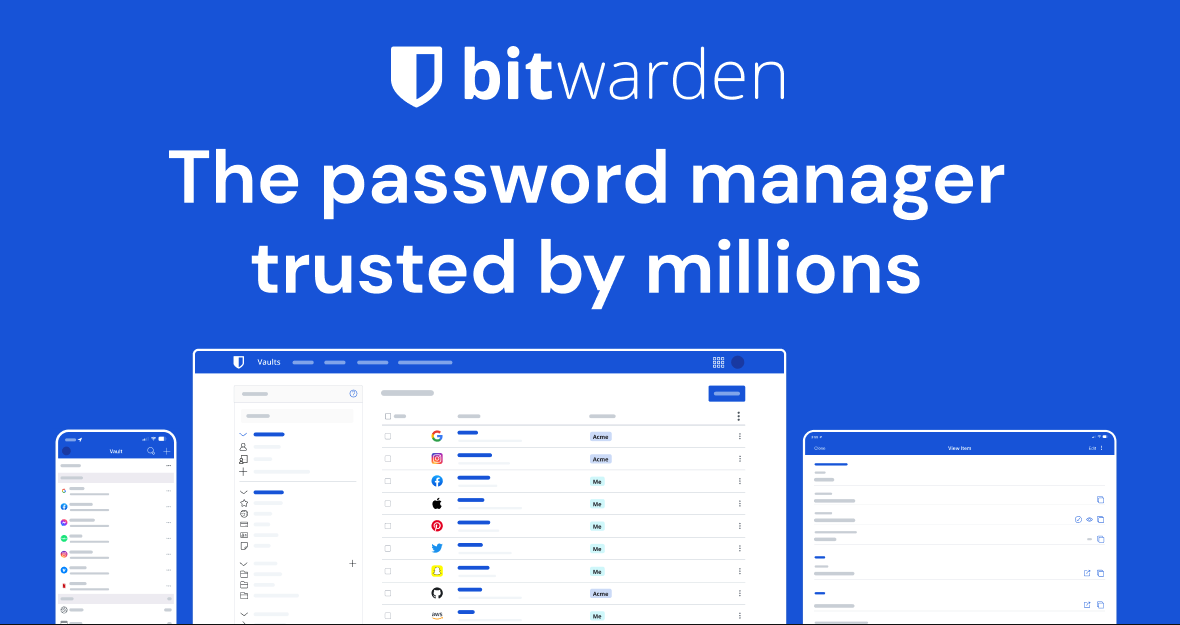European Alternatives to 1Password, LastPass, and NordPass
Let’s face it—managing passwords without help is a disaster waiting to happen. Between CRM logins, cloud tools, banking portals, and social media accounts, most of us are guilty of recycling weak passwords or (worse) scribbling them on sticky notes. That’s where a proper password manager comes in. It’s not just convenient; it’s your first line of defence against breaches.
Here’s what a good one does for you:
Creates bulletproof passwords—so you never default to something laughably easy to crack.
Locks everything down in an encrypted vault—way safer than that unsecured Excel file floating around your team’s drive.
Auto-fills logins seamlessly—saving you time and sparing you from typos.
Let's you share access securely—no more Slack messages with passwords in plain text.
1Password LastPass and NordPass are great, sure, but here’s the thing: it’s not European. And if your business operates in the EU, that matters. GDPR isn’t just red tape—it’s a real consideration for where your data lives. Opting for a European alternative means fewer legal grey areas and more control. Plus, let’s be honest, something is reassuring about keeping things local when it comes to compliance.

Exploring the European Front: Top Alternatives to 1Password, LastPass and NordPass
The EU’s tech scene isn’t just about regulation—it’s quietly building some of the most secure, user-friendly password managers out there. Forget the usual suspects; here are the homegrown alternatives worth your time:
Padloc (Germany)
German engineering meets open-source transparency. Padloc’s appeal isn’t just its clean interface or cross-platform support—it’s the fact that anyone can audit its code. That’s a big deal if your team cares about trust-through-verification. No shady backdoors, just straightforward password management with a community-backed approach.
Proton Pass (Switzerland)
Switzerland doesn’t just do banks and chocolate—it does privacy right. From the team behind ProtonMail, this one’s built on end-to-end encryption and third-party audited security. The killer feature? Email aliases that let your sales team sign up for tools without handing over real addresses. Fewer spam traps, fewer breaches.
Passbolt (Luxembourg)
Built for teams that actually share logins (safely, for once). Passbolt’s open-source setup gives devs granular control over permissions, and its API plays nice with existing infrastructure. If your team argues about who gets access to what, this one cuts the drama.
pCloud Pass (Switzerland)
Already using pCloud for storage? This ties everything together. Zero-knowledge encryption means even pCloud can’t peek at your passwords, and sharing stays locked down. It’s the Swiss Army knife of password managers—simple, but no compromises.
Heylogin (Germany)
Heylogin, also from Germany, takes a distinctive approach to authentication: it cleverly removes the need for a traditional master password by using phone-based login confirmation. This innovative method simplifies the login experience while maintaining security, potentially reducing friction for users who find master passwords cumbersome. It's an interesting option for businesses looking for a truly streamlined authentication flow.
Hypervault (Belgium)
From Belgium, Hypervault provides password management with a handy Chrome browser add-on, making it convenient for teams heavily reliant on Chrome-based workflows. While perhaps not as feature-rich as some of its broader competitors, its focused approach can be appealing for smaller teams or those with specific browser-centric needs.
Password Depot (Germany)
Password Depot, yet another German entrant, specifically targets the business market. It offers a powerful, flexible password manager that caters to diverse organisational needs, including various storage options (local files, network drives, cloud). Its comprehensive feature set makes it suitable for businesses that require strong administrative oversight and customizable deployment options.
Uniqkey (Denmark)
Uniqkey, from Denmark, is explicitly designed for team and company needs. It emphasises secure password creation, robust sharing functionalities, and comprehensive administrative oversight. Its focus on the team dynamic makes it a strong choice for businesses seeking an integrated solution to manage access across their entire workforce, simplifying both onboarding and offboarding.

Bitwarden (Open-Source, Global Presence)
While Bitwarden is open-source and has a global footprint, it's frequently highlighted in European contexts due to its strong security model and the ability for organisations to self-host, which can align with data sovereignty requirements. Its widespread adoption and active community also make it a popular choice for businesses seeking a highly customizable and auditable solution.
Beyond Passwords: Sharing 2FAs
Here's an uncomfortable truth about modern team security: While password managers have revolutionised how we share credentials, they leave a glaring vulnerability when it comes to two-factor authentication (2FA).
Consider these everyday scenarios:
Your marketing team needs access to shared social media accounts
IT administrators manage cloud infrastructure consoles
Finance teams log into banking portals
Each requires 2FA, yet most solutions fail teams spectacularly. Authenticator apps tie codes to individual phones. SMS verification goes to a single number. The result? Security bottlenecks and risky workarounds like reading codes aloud or forwarding SMS messages.

Daito: Berlin's Answer to the 2FA Sharing Problem
Based in Germany's tech hub Daito addresses this overlooked challenge with a specialised approach:
Browser-Based 2FA Access: Eliminate the "key person risk" of phone-bound authenticator apps. Team members can access necessary 2FA tokens from any authorised device through a secure web interface.
Managed SMS Verification: For services still relying on SMS codes, Daito provides a secure shared inbox with full audit capabilities, finally making text-based 2FA workable for teams.
Precision Access Controls: Administrators can grant specific team members access to particular 2FA tokens, mirroring the granular permission structures of top password managers. Every access is logged for complete visibility.
Why This Matters for European Businesses
While EU-developed password managers like Padloc or Proton Pass excel at credential management, Daito completes the security picture by properly solving shared 2FA. It's not a competitor to password managers, but rather the missing piece that makes them truly team-ready.
For organisations prioritising both security and collaboration, this Berlin-built solution represents the next evolution in access management - one that finally acknowledges how modern teams actually work.
The lesson? True security requires specialised tools working together. Your password manager handles the first layer. Daito secures the second. And your team stops wasting time on insecure workarounds.